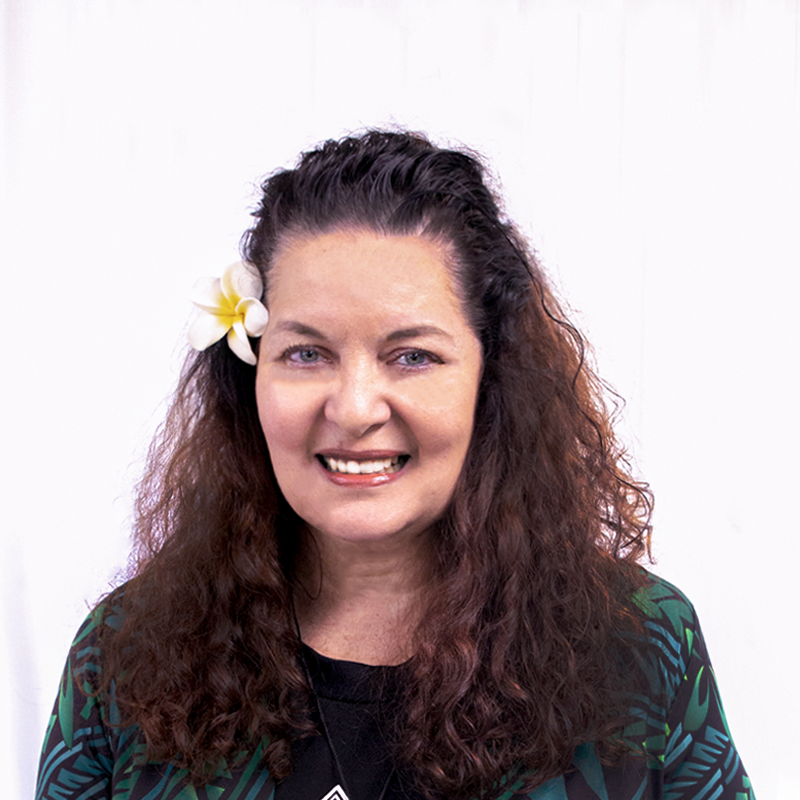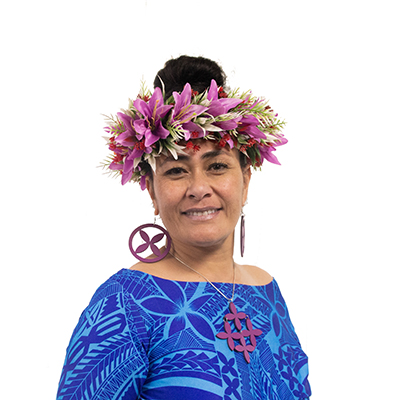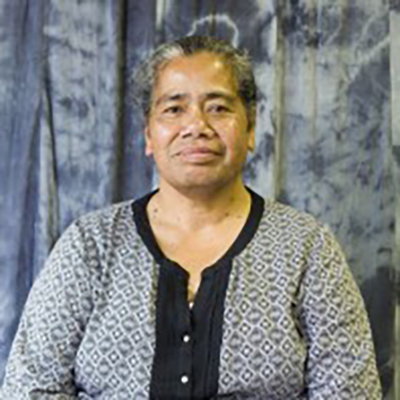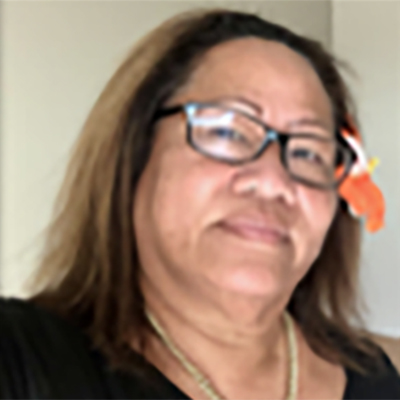Our People
Rae Si'ilata
Rae is of Ngāti Raukawa, Tūhourangi, Fijian, Irish, and Scottish descent, with whānau connections to Samoa, Tonga, and Tokelau. She is Director of Va‘atele Education Consulting which is contracted to deliver Ministry of Education PLD and research contracts with ECE services, and primary and secondary schools. Current projects focus on supporting leaders, teachers and learning assistants to privilege and utilise heritage languages and cultures within their learning spaces.
During her career, Rae has been a teacher and principal in Aotearoa and in Samoa. From 2005-2020, Rae worked as a lecturer/senior lecturer at the University of Auckland, supporting teachers with postgraduate study. From 2020 to 2024, she also supported Māori and Pacific doctoral students at Te Whare Wānanga o Awanuiārangi.
Kyla Hansell
Tena koutou, talofa lava, malo e lelei…
Ko Ngatokimatawhaorua te waka
Ko Hokianga Whakapau Karakia te moana
Ko Taniwha Whakarongorua te maunga
Ko Utakura te awa
Ko Mokonuiarangi te marae
Ko Nga Puhi te iwi
Ko Te Popoto te hapu
Ko Muriwai te whanau
Tihei mauri ora!
My name is Kyla Hansell and I am Māori and German-Samoan.
My experience with working with Emergent Bilingual students comes from 9 years working as a Primary teacher in East Auckland. I completed my Graduate Diploma of TESSOL in 2015. In 2015 I was also part of the Manaiakalani Innovative Teachers professional learning group, and inquired into translanguaging in digital immersion classrooms.
In 2016 I won a Teachnz study award and put myself in the shoes of a second language learner, completing a Certificate in Proficiency in Te Reo Maori at Te Waananga Takiura o ngā Kura Kaupapa Māori o Aotearoa.
In 2020, I became project coordinator at Vaʻatele Education Consulting. I am so privileged to work in this space, talking about what I love, and supporting teachers who are transforming their classrooms.
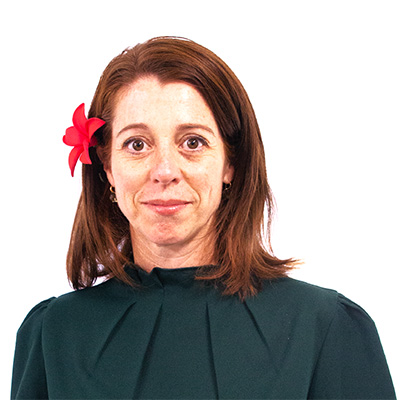
Grace Ormsby Abazu
Kia Ora, my name is Grace Ormsby-Abazu.
I have started calling myself a ‘Pacific raised Palangi’, a term shared with me by a friend with a similar upbring. I spent my childhood growing up in rural Papua New Guinea, before returning to NZ with my family to continue my schooling. I then spent my early primary teaching years in Samoa. I have been blessed to travel and work in different locations around the world throughout the past 25 years. This has significantly impacted my ongoing understandings of language, culture, identity, and values.
I am passionate about working with others and seeing them flourish in who they are, from our youngest students through to experienced professional practitioners. I am always excited to see others grow in confidence as they explore and develop in their own learning journey.
I am very blessed to be working in this space with the Vaʻatele Team as we work collaboratively in translating theory into practice, especially in the areas of Bilingualism, Biliteracy and Second Language Acquisition.

Professor Janet Gaffney
Ko te tātai hono i waenganui i a onamata, a inamata, a anamata hoki,
ko ā tātou tamariki me ō tātou tūmanako mō rātou.
Children are our living link to our past, our hope for today
and our vision for the future.
This whakatauki was gifted to me in honour of my Inaugural Professorial Lecture at the University of Auckland by John McCaffery. I strive to live this proverb and keep it at the heart of every decision that I make.
I was honoured to be recruited for the position of Professor of Educational Psychology-Literacy and to develop the Marie Clay Research Centre in the Faculty of Education and Social Work at the University of Auckland. I was aware of the gifts that Aotearoa New Zealand had shared with the world in terms of Te Tiriti o Waitangi, nurturing tamariki, early learning and development, and languages and literacies. Teachers and researchers around the world have been studying early childhood development, learning and literacy for several decades and saw Aotearoa New Zealand as leading the way for the rest of the world. One of my edited books, Stirring the Waters: The Influence of Marie Clay, is a collective tribute of chapters by international researchers whose work was impacted by this pioneer and the first female Professor at the University of Auckland. I am privileged to direct the Centre in her name.
I was attuned to Aotearoa from my teaching experience from kindergarten through Year 12, primarily with Native Americans in tribally-operated schools in the USA. When I attended Arizona State University to earn my PhD, I was able to focus on Indigenous studies, bilingual education and literacy with leaders in these fields. I blended my teaching experience with my research and cemented my commitment to work alongside children, their families and communities, and to continue to learn with my heart and mind.
Prior to moving to Aotearoa in 2012, I was a Professor at the University of Illinois and a Senior Researcher at the Center for the Study of Reading. I served as the Director and Reading Recovery Trainer for 8 years, supporting implementation across 10 states. My research on literacy learning and teaching, and teacher leadership is intentionally focussed on facilitating the organic design of system innovations with collaborative and innovative teacher leaders who view student learning as the centripetal force that drives their thinking and actions. My research addresses linguistic, cultural, and family literacies with an emphasis on equitable opportunities for children and youth. I serve on multiple editorial boards including Reading Research Quarterly, Journal of Literacy Research, Journal of Teacher Education, and Teacher Education and Special Education.

Maliana Taufalele
Mālō e lelei. Ko Maliana Koli Taufalele au, pea ko ‘eku lele maí, mei he ‘Esi-ko-’Elenoa mei he Fatafatamāfana, Vava’u Lahi. ‘Oku te fakafeta’i ki he ‘Otuá, he fakakoloa kuo fai ‘o tau felōngoaki ai heni. Fakatauange ‘oku tokamālie e me’a kotoa pē, ‘i ha tapa ‘o e kolopé, ‘oku mou me’a mai mei ai.
I began my teaching journey in Tonga in 1990 before moving to New Zealand in 1998. I am a year 7 and 8 teacher at Sutton Park School in South Auckland. As well as blessed with the role of the leader of the Tongan Bilingual Unit at our school.
Last year, it was a great privilege to be part of the facilitation team for Va’atele with the leadership of Dr. Rae Silata. The richness of knowledge and wisdom that the team brings together really helps me in my own practice.
It is my dream to see our Pasifika become successful as Pasifika students and whatever success may look like to them and their families.
‘Ofa lahi atu.
Martha Aseta
Talofa lava
My name is Martha Aseta and I come from the villages of Sāfaatoa Lefaga and Lepea on the island of Upolu, Samoa.
I am a primary school trained teacher and I have taught in year 7 and 8 Samoan bilingual and English-medium classrooms in South Auckland. My interests lie in bilingualism and biliteracy, Samoan-medium education and Pasifika education. I joined Va’atele as a researcher in 2020, and I am proud to be part of a team of professionals dedicated to privileging the linguistic and cultural resources of Pacific fanau and aiga in education. My current research focuses on exploring graduate experiences of Samoan Bilingual/Immersion Education and its impact on their lives.
Fa’afetai lava
Meg Jacobs
Kia ora koutou, Mauri, Tālofa, Kia orana, Fakaalofa lahi atu, Mālō nī, Ni Sa Bula Vinaka, Mālō e lelei, Talofa lava, and warm Pacific greetings to all.
My name is Meg Jacobs. I am from the midwestern US state of Iowa with Irish, German, and Swiss ancestry. I moved to Aotearoa New Zealand with my husband and our two sons in 2017 to begin a Research Fellowship in the Marie Clay Research Centre at the University of Auckland.
Dr. Rae Si‘ilata invited me to contribute to the Pasifika Early Literacy Project in 2019. My research interests, shaped by a 15-year primary school teaching career in the US, include literacies undervalued in educational settings, and making visible the contribution of families to children’s early literacies. My new role as a lecturer in the School of Education at Auckland University of Technology allows me share the work of PELP with my students who are preparing to be ECE and primary teachers. I am grateful to learn from the PELP collective and to privilege Pacific languages and literacies alongside children, families, and teachers. Kia ora.


